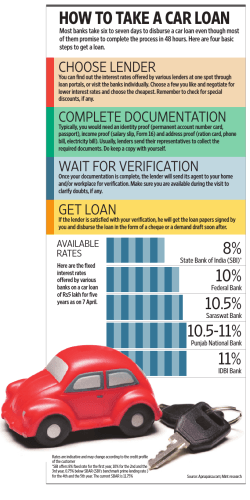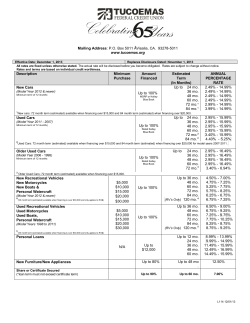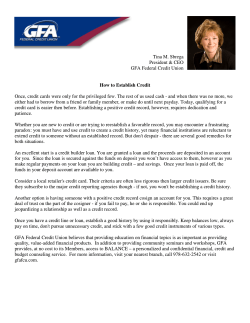
Document 230565
SME Toolkit - How to Finance Your Business http://us.smetoolkit.org/us/en/content/en/478/How-to-Finance-... http://us.smetoolkit.org/us/en/content/en/478/How-to-Finance-Your-Business SME Toolkit www.smetoolkit.org Print How to Finance Your Business Provided by My Own Business, Content Partner for the SME Toolkit First Things First How Much Money Do You Need? What do you need it for? Unsecured Loans Secured Loans Collateral Loans vs. Investment Where to Get the Money Types of Funding Sources Lender Comparison Table The Art of Getting the Money Business Loans Repayment Plan Other Quick Tips After You Get the Money Activities SESSION 8 Business Plan [Back to top] First Things First Money makes your business go. But don't try going to a bank to get it when you've just started in business. Banks normally make loans only to businesses with operating histories. This section will give you some alternatives, some strategies and some things to think about as you go about finding the money to make your business work. Our first reminder is that personal savings should be considered the primary source of funds for starting a business. If you haven't started already, start now to 1 of 8 5/18/10 3:42 PM SME Toolkit - How to Finance Your Business http://us.smetoolkit.org/us/en/content/en/478/How-to-Finance-... begin accumulating cash through personal savings. Also, don't overlook the Small Business Administration (SBA) loan guarantee programs available for start-up businesses. With a SBA guarantee program in hand, your bank will be happy to talk with you! Refer to the Resources section to get more information. [Back to top] How Much Money Do You Need? Or, how much can you reasonably expect to get? Don't get too excited just yet this is not your chance to ask for a million dollars when you only need $50,000. Refer back to your business plan. If it still doesn't answer the question, let's go step-by-step. What do you need it for? Buying supplies and inventory while waiting to get paid Paying payroll and rent Buying equipment and fixtures Getting a computer OR Buying the business Prioritize those areas where your options are limited to paying in cash, and review your alternatives where there may be another way. For example, it is not necessary to pay all cash for a delivery truck when you can rent or lease one. Next review what might serve as collateral for your loans. Some credit is granted on an unsecured basis, such as credit cards, but most small business loans are secured by the assets of your business or your personal assets or both. Unsecured means that there is no collateral granted for the loan. Examples of unsecured are: Credit cards Unsecured lines of credit (like you get in the mail) Friends or relatives Secured loans mean that there are assets pledged to secure the payment in the event you are not able to pay. Examples of this are: Computer lease Home mortgage Car loan or lease Small Business Administration loan Common types of collateral are equity in your home, accounts receivable, inventory of the business and equipment. Lenders go through an evaluation of the 2 of 8 5/18/10 3:42 PM SME Toolkit - How to Finance Your Business http://us.smetoolkit.org/us/en/content/en/478/How-to-Finance-... collateral to determine how much they can lend against it. Some key variables as to what kind of loan terms you can get are: Number of years in business - This is your track record and is very important. Banks usually require three years while others are less stringent. Size of your company and the amount needed - Financing institutions vary in the way they service the public. For example, you would probably not get a car loan and a large corporate loan at the same place. Do your research. Ask around. Get to the right spot. [Back to top] Loans (Debt) vs. Investment (Equity) You are most likely familiar with a straight loan (debt) where the lender gets an interest rate and fees. Testimonial John Marder Banker Equity is where the money raised gives the investor an ownership interest. This is common in the sale of stock to a limited number of investors or participation by venture capitalists. The sale of stock is highly regulated by state and federal agencies and you will need the help of a corporate lawyer. Normally the initial sale of stock to the public (initial public offering or IPO) is deferred until an earnings history is established. "One of the worst mistakes you can make is to ask for more money than you can afford to repay." Transcription - html Sometimes such a discussion arises with friends and family who want to be your partner. Consider this carefully because they will then participate in the increased value of the business and have voting rights. It is well beyond the scope of this discussion to cover all the aspects of debt and equity. Just be careful! Your lawyer and accountant would be appropriate sources for more information on this subject. [Back to top] Where to Get the Money The chart below will show some differences between some of the types of lenders. Terms will vary considerably from lender to lender; the summaries in the chart are only meant to be representative and give you an idea of what to expect when seeking money from different sources. Important issues to consider: Cost Payback program Loan size 3 of 8 5/18/10 3:42 PM SME Toolkit - How to Finance Your Business http://us.smetoolkit.org/us/en/content/en/478/How-to-Finance-... Some of the pros and cons of the different lenders are briefly listed below. There will likely be one common characteristic among them all. As an entrepreneur, you will be legally obligated to have individual responsibility for the credit obligation of your business. Regardless of legal organization (covered in Session 4), lenders will have documentation to circumvent the organizational structure. This is usually called a personal guarantee. Don't panic! It is very common. 4 of 8 Type Cost Payback Terms Personal Savings No cost None Friends & Family Usually Very flexible good rate or none Home Mortgages Traditional or Seconds 7-9% Credit cards Sizes For Against Easy, cheap Risk of Loss Flexible, best value Can create friction Very long and fl exible 80-100% + of Cheapest, home equity value longest term Your house is at risk in the event of non-payment 16-23% 40-60 months 3,000-10,000 Easy qualifying, no collateral Small amounts Suppliers Free 30 days +/- Inexpensive, unsecured Short term Landlord Adds to rent Over term of cost lease Preserves cash for assets you can't take with you Hard to get; assets acquired are usually only good at one location; difficult to move Venture capital 25-40% 5-7 years Can get large amounts Very hard to get; share ownership Commercial mortgage 7-9% 25 year $300,000+; 75% payment; all of appraisal due in 10 years 8-14% on equity loans $500,000+ 5/18/10 3:42 PM SME Toolkit - How to Finance Your Business http://us.smetoolkit.org/us/en/content/en/478/How-to-Finance-... Specialized 12-18% lenders (industry expertise, auto, business brokers, high tech, specialized equipment, computers, phones, etc.) 5-7 years Varies Accessible Debt service through dealer, can be high who is motivated to make sale of equipment or business; payback terms more favorable than bank Leasing companies 12-18% 5-7 years Varies Same as above; also 100% fi nancing SBA 7-9% 7-20 years $50,000-1,000,000 Longest payback for other than real estate loan Finance companies 14-30% 1-3 years $100,000+ An alternative Expensive; when you don't picky about have many collateral Banks 6-9% 1-5 years $50,000+ Generally least Generally expensive hardest to qualify for Can be a complex process [Back to top] The Art of Getting the Money This starts by knowing what your lender wants. A common way is to simply ask. A better way is to ask a friend or business advisor such as your CPA. For a business loan, the most common things are: Business financial statements Business tax returns Business Plan with budget or projection Personal financial statements Personal tax returns Step two is to be ready to answer questions about your business, and be ready to highlight your financial performance both in the past and in the future. You will be more impressive if you have carefully thought-out and become familiar with your plan. Bring your accountant if you need help. 5 of 8 5/18/10 3:42 PM SME Toolkit - How to Finance Your Business http://us.smetoolkit.org/us/en/content/en/478/How-to-Finance-... Be prepared to tell them why you need the money. "I just need the money," does not inspire confidence or the fact that you have thought it through. Earlier in this session you studied a number of different purposes. Give them some detail. Propose a repayment plan. Examples of different structures are: A line of credit, payable at your discretion but subject to renewal annually by the bank Term loan payable monthly over ___ years starting on ____ date Most places have some flexibility. Potential lenders appreciate that you are thinking about paying them back instead of just getting the money. Other tips to keep in mind: Needless to say, being well dressed and neat in appearance at bank meetings will reflect positively. Most lenders (including the SBA) will want to see your business plan. Keep your lenders informed on the status of your business: the good and the bad. If you are unable to make a loan payment on time, call your lender in advance, advise him/her of the problem and request the extension you need. Explain the sources of repayment. Virtually all lenders will do a personal savings and corporate credit check through a company called TRW or other means. Be prepared to discuss any prior credit issues/problems. The best access to a lender is by a referral. Lending is a people business. Have your CPA or attorney or friend introduce you to a lender. The first thing that will spook lenders or investors is the fear you are "puff" rather than "substance." Avoid giving the impression of being an over optimistic, "pie-in-the-sky" operator. Most start-up businesses don't find a place for expensive entertaining. Your lenders will be more interested in knowing how their money is being used to grow your business. Do not depend on a bank to loan you money to start a business. Most small businesses are funded by personal savings. Make a shrewd appraisal to minimize your risks and to limit losses to a predetermined limit. Your suppliers and vendors can be sources of financing. For example, if you need an illuminated sign for your store front, the company you contract with to make the sign may provide financing so you can make monthly payments rather than pay cash. (They want your business.) Examples: Longer payment terms Advertising and marketing assistance Furnishing or financing of equipment, signs or inventory. 6 of 8 5/18/10 3:42 PM SME Toolkit - How to Finance Your Business http://us.smetoolkit.org/us/en/content/en/478/How-to-Finance-... Advertising and promotional programs Bartering, which is to trade by exchange one commodity for another, can provide a source of financing. For example your advertisements in the local newspaper might be paid for by the bagels you make! [Back to top] After You Get the Money Getting the money is only the first step. You should strive to be a good customer so you can get cooperation if you need help later. A good customer sticks to his/her agreement. Make sure you understand the requirements and perform to them as much as possible. In a business relationship, lenders will ask for regular financial statements, which you should produce on time. There may be covenants. A covenant is a written agreement in which you promise to meet specified obligations such as submitting the agings of your accounts receivable. The "agings" report will show the lenders if your credit customers are paying on time or not. Be proactive. Contact them if there is a problem. Be sure to stay in touch even if nothing new is going on. Get to the next highest level within the organization. [Back to top] Activities Sources of financing can surface from unexpected sources: List at least five of them: A. B. C. D. E. ________________________________ ________________________________ ________________________________ ________________________________ ________________________________ Some possible answers are: Suppliers: Ask for longer terms of payment. Your landlord: Ask the landlord to provide you with tenant improvements. Your customers: Ask for either cash or prompt payment. Your capital investments: Ask the suppliers of your fixtures, equipment and signs to finance your purchases. They will be interested in doing so in order to get your business. [Back to top] Business Plan for Session 8: How to Finance Your Business 7 of 8 5/18/10 3:42 PM SME Toolkit - How to Finance Your Business http://us.smetoolkit.org/us/en/content/en/478/How-to-Finance-... We heartily recommend that you download the individual business plan template for this session Business Plan Template Document 8 and complete it now. Section 8: Financing MS Word Instructions on filling in the business plan template: 1. Each box has a permanent title in CAPITAL LETTERS 2. Below each title is a sentence starting with an "Insert here" sentence. This will suggest information to insert. The boxes will enlarge as you take up more room so use all the space you need. 3. After completing each box, delete the "Insert here" sentence, which will leave only the permanent title of the box and the information you have filled in. We suggest that you fill in each section of the business plan as you proceed through the course. The template for all sessions 1-12 can also be downloaded into your computer as a single document: Section 1-12: All MS Word Include sufficient research findings and background materials. Make it interesting up by the use of background data, your biography, charts, demographics and research data. When your business plan is completed, print off and assemble the 12 sections. Many other business plan formats are available in libraries, bookstores and software. [Back to top] Proceed to Session 9: E-Commerce Copyright © 1993, 1997-2010, My Own Business, Inc. All Rights Reserved. 8 of 8 5/18/10 3:42 PM
© Copyright 2026











